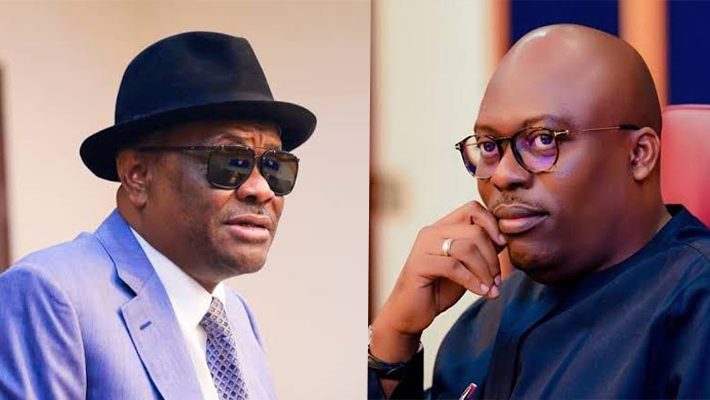Politics
Rivers crisis: Tension as Wike, Fubara reconciliation suffers setback

More than two weeks after President Bola Tinubu declared a state of emergency in Rivers State, attempts to broker peace between Governor Siminalayi Fubara and Federal Capital Territory Minister Nyesom Wike remain stalled, with no visible progress in reconciliation efforts.
Governor Fubara, Deputy Governor Ngozi Odu, and all members of the state legislature were suspended for six months following the political crisis that gripped the state. The National Assembly swiftly approved the President’s emergency declaration and proposed a reconciliation committee, yet no substantial steps have been taken since.
Sources within the state have indicated that the inaction stems partly from the role played by some key leaders during the crisis. According to a political insider from the Ijaw community, many of these figures failed to remain impartial and instead aligned themselves with either Wike or Fubara.
“Those that should have led us out of the woods this time around took sides in the crisis. They lack the credibility to call the two parties to a roundtable,” the source said.
He added: “Former President Goodluck Jonathan, who should have led the peace talks at this time, was pushed to side with Governor Fubara in the crisis. The Ijaw National Congress (INC), led by Prof. Benjamin Okaba, disappointed the Ijaw through its obvious partiality in the matter. Prof. Okaba did not help matters at all. The body can no longer be deployed to ensure genuine reconciliation. The leadership of the Pan Niger Delta Forum (PANDEF) also took a position in the crisis.”
He further lamented the political polarization: “You remember that all the elders in Rivers are already divided into Wike’s or Fubara’s elders. These are people that should have risen to the occasion at this point, but they no longer command the respect that can foster genuine reconciliation. As it stands, there is nothing visible being done to kick-start any reconciliation.”
As the political uncertainty deepens, Governor Fubara has reportedly returned to his private residence in Port Harcourt, while several lawmakers are said to be abroad.
In a strongly worded critique, President of the Ijaw Youth Council (IYC) Worldwide, Jonathan Lokpobiri, faulted the Ijaw community for mishandling the situation.
“Permit me to reflect on the state we are as Ijaw nation regarding the state of emergency in Rivers,” he said. “I can, with all sense of responsibility and conviction, state that if we had applied wisdom in the management of this crisis in Rivers, we would not be where we are today. Instead of using wisdom in matters we can nip in the bud, we chose to threaten war that we were not prepared for. I have seen over times that emotion has never won a war. But planning and strategic consultations do.”
Lokpobiri added: “People in the name of struggle, even in the matters we can nip in the bud and caution ourselves internally, rush to the media and threaten war and give the enemies an opportunity to fortify themselves for it, and when the war comes, we no longer speak.”
He emphasized that careless rhetoric from some leaders derailed potential peace efforts. “People speak carelessly in an attempt to put an ethnic group into a war that is avoidable. For those who threatened fire and brimstone, the war came but I didn’t hear their voices anymore. We must be wise in prosecuting the struggles of the Niger Delta.”
“If this was how our leaders went about their struggle, I am not sure anybody would have respected the Ijaw nation. Most of those making unguarded statements are people we clap for without cautioning them. There is no war between Ijaw and Ikwerre and any other ethnic group. If the Ikwerre ethnic group had responded to our unguarded statements, there would be war already in Rivers,” he added.
While backing a return to governance for Fubara, Lokpobiri called for caution. “Sometimes wisdom is stronger than the arms we think we have gathered. If we had solved this problem internally as we advised earlier, we wouldn’t get to this embarrassing moment of a state of emergency. I expected missiles to flow when this state of emergency was declared, but those who threatened the war never said anything anymore.”
Meanwhile, President of the Movement for the Survival of the Izon Ethnic Nationality in the Niger Delta (MOSIEND), Kennedy Tonjo-West, said he has initiated consultations aimed at launching the reconciliation process.
“I am already undertaking some consultations so that the process of reconciliation can start on time. We want Rivers to return to a process of reconciliation without any delay,” he stated.
Vice-Admiral Ibok Ibas (rtd), appointed as Rivers State’s Sole Administrator, officially took office on March 20 following the emergency declaration.
(NATION)





















